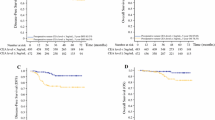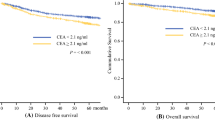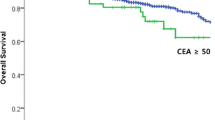Abstract
Background
We evaluated the prognostic value of the preoperative serum carcinoembryonic antigen (CEA) level in patients with colorectal cancer (CRC).
Patients and Methods
The study group comprised 638 patients. The optimal cutoff value for the preoperative serum CEA level was determined. Predictive factors of recurrence were evaluated using multivariate analyses. The relapse-free time was investigated according to the CEA level.
Results
All patients underwent potentially curative resection for CRC without distant metastasis, classified as stage I, II, or III. The optimal cutoff value for preoperative serum CEA level was 10 ng/ml. Elevated preoperative serum CEA level was observed in 92 patients. Multivariate analysis identified tumor–node–metastasis (TNM) stage and preoperative serum CEA level as independent predictive factors of recurrence. The relapse-free survival between CEA levels >10 ng/ml and <10 ng/ml significantly differed in patients with stage II and III. However, there was no significant difference in relapse-free survival between CEA levels >10 ng/ml and <10 ng/ml in patients with stage I.
Conclusion
Preoperative serum CEA is a reliable predictive factor of recurrence after curative surgery in CRC patients and a useful indicator of the optimal treatment after resection, particularly for cases classified as stage II or stage III.




Similar content being viewed by others
References
Marugame M, Kamo K-I, Katanoda K, et al. Cancer incidence and incidence rate in Japan in 1999: estimates based on data from 11 population-based cancer registries. Jpn J Clin Oncol 2004;34: 352–6.
Japanese Society for Cancer of the Colon and Rectum: multi-institutional of Large Bowel Cancer in Japan, Cause treated in 1995–1998. Vol 17 (1999), Vol 18 (2000), Vol 21 (2001), Vol 24 (2003). Kinbara, Tokyo, Japan
Moertel CG, Fleming TR, Macdonald JS, et al. Levamisole and fluorouracil as adjuvant therapy of resected colon carcinoma. N Engl J Med 1990;32: 352–8.
Wolmark N, Rockette H, Fisher B, et al. The benefit of leucovorin-modulated fluorouracil as postoperative adjuvant therapy for primary colon cancer: result from National Surgical Adjuvant Breast and Bowel Project protocol C-03. J Clin Oncol 1993;11: 1879–87.
International Multicentre Pooled Analysis of Colon Cancer Trial (IMPACT) Investigators. Efficacy of adjuvant fluorouracil and folinic acid in colon cancer. Lancet 1995;345: 937–44.
O’Connell MJ, Laurie JA, Kahn M, et al. Prospectively randomized trial of postoperative adjuvant chemotherapy in patients with high-risk colon cancer. J Clin Oncol 1998;16: 295–300.
Andre T, Boni C, Gramont A, et al. Oxaliplatin, fluorouracil, and leucovorin as adjuvant treatment for colon cancer. New Engl J Med 2004; 350: 2343–51.
Twelves C, Wong A, Scheithauer W, et al. Capecitabine as adjuvant treatment for stage III colon cancer. New Engl J Med 2005;352: 2696–704.
de Gramont A, Figer A, Seymour M, et al. Leucovorin and fluorouracil with or without oxaliplatin as first-line treatment in advanced colorectal cancer. J Clin Oncol 2000;22: 229–37.
Douillard JY, Cunningham D, Roth AD, et al. Irinotecan combined with fluorouracil compared with fluorouracil alone as first-line treatment for metastatic colorectal cancer: a multicentre randomized trial. Lancet 2000;355: 1041–7.
Herwits H, Fehrenbacher L, Novotny W, et al. Bevacizumab plus irinotecan, fluorouracil, and leucovorin for metastatic colorectal cancer. N Engl J Med 2004;350: 2335–42.
Wood CB, Ratcliffe JG, Burt RW, et al. The clinical significance of the pattern of elevated serum carcinoembryonic antigen (CEA) levels in recurrent colorectal cancer. Br J Surg 1980;67: 46–48.
Wichmann MW, Müller C, Lau-Werner U, et al. The role of carcinoembryonic antigen for the detection of recurrent disease following curative resection of large-bowel cancer. Langenbecks Arch Surg 2000;385: 271–5.
Chau I, Allen MJ, Cunningham D, et al. The value of routine serum carcino-embryonic antigen measurement and computed tomography in the surveillance of patients after adjuvant chemotherapy for colorectal cancer. J Clin Oncol 2004;22: 1420–9.
McCall JL, Black RB, Toouli J, et al. The value of serum carcinoembryonic antigen in predicting recurrent disease following curative resection of colorectal cancer. Dis Colon Rectum 1994;37: 875–81.
Wanebo HJ, Rao B, Pinsky CM. The use of preoperative carcinoembryonic antigen level as a prognostic indicator to complement pathological staging. N Engl J Med 1978;299: 448–51.
Wichmann MW, Lau-Werner U, Müller C, et al. Carcinoembryonic antigen for the detection of recurrent disease following curative resection of colorectal cancer. Anticancer Res 2000;20: 4953–5.
Goldstein MJ, Mitchell EP. Carcinoembryonic antigen in the staging and follow-up of patients with colorectal cancer. Cancer Invest 2005;23: 338–51.
Lipská L, Visokai V, Levý M, et al. Tumor markers in patients with relapse of colorectal carcinoma. Anticancer Res 2007;27: 1901–5.
Watine J, Miedouge M, Friedberg B. Carcinoembryonic antigen as an independent prognostic factor of recurrence and survival in patients resected for colorectal liver metastases: a systematic review. Dis Colon Rectum 2001;44: 1791–9.
Wiratkapun S, Kraemer M, Eu KW, et al. High preoperative serum carcinoembryonic antigen predicts metastatic recurrence in potentially curative colonic cancer: results of a five-year study. Dis Colon Rectum 2004;44: 231–5.
Gold P, Freedman SO. Demonstration of tumor specific antigens in human colonic carcinomata by immunological tolerance and absorption techniques. J Exp Med 1965;121: 439–62.
Moertel CG, O’Fallon JR, Go VLW, et al. The preoperative carcinoembryonic antigen test in the diagnosis, staging and prognosis of colorectal cancer. Cancer 1986;58: 603–10.
Harrison LE, Guillem JG, Cohen AM, et al. Preoperative carcinoembryonic antigen predict outcomes in node-negative colon cancer patients: A multivariate analysis of 512 patients. J Am Coll Surg 1997;185: 55–9.
Slentz K, Senagore A, Hibert J, et al. Can preoperative and postoperative CEA predict survival after colon cancer resection? Am Surg 1994;60: 528–32.
Wang JY, Lu CY, Hsieh JS, et al. Prognostic significance of pre- and postoperative serum carcinoembryonic antigen levels in patients with colorectal cancer. Eur Surg Res 2007;39: 245–50.
Behbehani AI, Al-Sayer H, Farghaly M, et al. Prognostic significance of CEA and CA 19-9 in colorectal cancer in Kuwait. Int J Biol Markers 2000;15: 51–5.
Julia ML, Cassandra MM, Jennifer EH, et al. Identification of early-stage colorectal cancer patients at risk of relapse post-resection by immunobead reverse transcription-PCR analysis of peritoneal lavage fluid for malignant cells. Clin Cancer Res 2006;12: 417–23.
Sadahiro S, Suzuki T, Makuuchi H, et al. Detection of carcinoembryonic antigen messenger RNA-expressing cells in peripheral blood 7 days after curative surgery is a novel prognostic factor in colorectal cancer. Ann Surg Oncol 2006;14: 1092–8.
Park JY, Lee KH. Carcinoembryonic antigen and patterns of recurrence after curative resection of the colorectal cancer. Hepatogastroenterology 2007;54: 1966–9.
Eggington S, Tappenden P, Pandor A, et al. Cost-effectiveness of oxaliplatin and capecitabine in the adjuvant treatment of stage III colon cancer. Br J Cancer 2006;95: 1195–201.
Aballéa S, Chancellor JV, Raikou M, et al. Cost-effectiveness analysis of oxaliplatin compared with 5-fluorouracil/leucovorin in adjuvant treatment of stage III colon cancer in the US. Cancer 2007;109: 1082–9.
Aballéa S, Boler A, Craig A, et al. An economic evaluation of oxaliplatin for the adjuvant treatment of colon cancer in the United Kingdom (UK). Eur J Cancer 2007;43: 1687–93.
Author information
Authors and Affiliations
Corresponding author
Rights and permissions
About this article
Cite this article
Takagawa, R., Fujii, S., Ohta, M. et al. Preoperative Serum Carcinoembryonic Antigen Level as a Predictive Factor of Recurrence After Curative Resection of Colorectal Cancer. Ann Surg Oncol 15, 3433–3439 (2008). https://doi.org/10.1245/s10434-008-0168-8
Received:
Revised:
Accepted:
Published:
Issue Date:
DOI: https://doi.org/10.1245/s10434-008-0168-8




